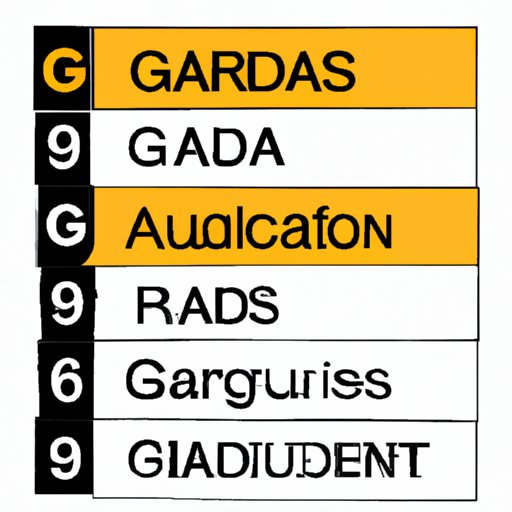Introduction
As a student or parent, understanding what a ‘C’ grade means is crucial for gauging academic performance. Many individuals perceive a ‘C’ as a negative mark, leading to unnecessary stress and anxiety. This article aims to clarify the meaning of a ‘C’ grade, explore the different grading systems, and examine the implications of a ‘C’ in various settings.
The Ins and Outs of Grading: Understanding What a ‘C’ Really Means
Grades can be assigned in many ways, such as letter grades, percentages, or pass/fail. The letter grading system is common in the US, where an ‘A’ signifies excellent work, and a ‘D’ reflects below-average performance. A ‘C’ represents average or satisfactory performance, while an ‘F’ denotes a failure.
Grades are assigned based on various factors, such as exams, coursework, participation, and attendance. The particular weightage assigned to each varies depending on the teacher and curriculum. For example, some courses may place more emphasis on homework assignments, while others on exams.
The grading scale can vary significantly, even within the letter grading system. In some cases, an ‘A’ may represent a score of 90-100, while in others, an ‘A’ may represent a score of 94-100. Similarly, a ‘C’ may correspond to a range of 70-79 or 73-76, depending on the grading scale.
A Parent’s Guide to Understanding a ‘C’ Grade
Many parents view a ‘C’ grade in negative light, often perceiving it as a sign of poor academic proficiency. However, this is not necessarily accurate, as a ‘C’ indicates average performance. It is essential to consider grades in the context of the subject matter, teacher’s expectations, and grade level. For example, a ‘C’ in an advanced placement course is generally considered better than a ‘C’ in a regular course.
Parents can help their children improve their grades by understanding their learning style and encouraging them to create achievable goals. For instance, they could set aside designated times for homework and study, work with their children’s teachers to identify potential areas for improvement, and provide positive reinforcement. Additional resources such as tutoring, online classes, and study groups can also be utilized to enhance academic performance.
The Pros and Cons of a ‘C’ Grade: Why It’s Okay to Be Average
There is a societal pressure to excel, leading many students to believe that anything less than perfect grades is a failure. This mindset often results in increased stress, anxiety, and burnout, as students tend to sacrifice their mental and physical health in pursuit of academic excellence.
It’s important to recognize the benefits of not striving for perfection all the time. For instance, students who accept occasional mediocre performance could experience less pressure, reduced anxiety, and more realistic expectations. Moreover, many successful people have achieved great accomplishments without perfect grades, highlighting that grades are not a measure of success in and of themselves.
‘C’ Gets Degrees: Exploring the Importance of Pass/Fail Grades in College
The traditional grading system in college is often challenging, leading students to prioritize grades over learning. Pass/fail grading aims to mitigate this by emphasizing students’ learning experience rather than their grades. In the pass/fail grading system, students receive either a pass or fail grade, with no letter grades assigned.
The pass/fail system can encourage students to take risks and experiment with new subjects without the fear of poor grades. Additionally, it can enable them to focus on learning and personal growth rather than grades. In such a system, a ‘C’ grade does not necessarily indicate average performance, as the focus is on passing rather than obtaining high grades.
Breaking Down the Meaning of a ‘C’ Grade: How It Affects Scholarships and Admissions
Grades are crucial in the college application process, as they help admissions committees assess students’ academic potential. Typically, colleges evaluate multiple factors such as grades, test scores, extracurricular activities, and personal essays.
A ‘C’ grade can impact a student’s chances of being accepted into their desired college or program, as it indicates average performance. Additionally, ‘C’ grades can be a factor in scholarship awards, as many are based on academic merit. However, a few ‘C’ grades are unlikely to harm an otherwise strong application, and students can take steps to improve their grades if required.
Conclusion
Understanding the meaning of a ‘C’ grade is crucial in contextualizing academic performance. While it represents average performance, it is essential to consider grades in the context of other academic and non-academic factors. Parents and students must acknowledge the benefits of striving for personal growth over perfection, and recognize that grades are not the sole measure of success. Instead, students should focus on learning and developing their skills. By taking positive steps towards academic improvement, students can achieve their desired goals and pave the way for future success.
